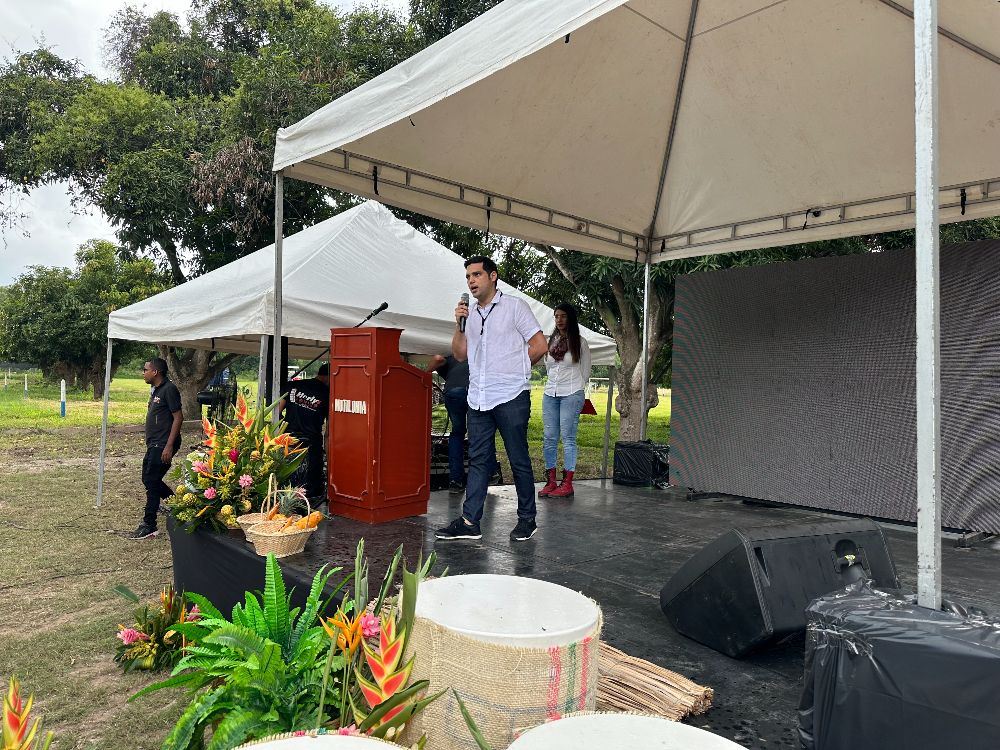Codazzi, Cesar. June 2, 2023. The execution of this initiative between the Government of Cesar and AGROSAVIA produced a total of 257 tons of sorghum silage, 404 tons of maize silage, and 2,870 bales of hay. This feed was delivered to 12 livestock producers' associations, directly benefiting 771 small farmers in the department. Furthermore, the project carried out 41 theoretical and practical knowledge transfer events for a total of 889 participants.
This science and technology project aimed at improving the water availability and management conditions in dry seasons for seven productive systems of interest to the territory, generated —in the scientific area— seven book chapters and five scientific articles published internationally in high-profile journals aimed at generating a positive impact on the IDIC (Innovation and Competitiveness Index) of the department of Cesar. The results of the initiative were disseminated to all stakeholders in the agricultural and regional sector: the Government of Cesar, the Mayor's Office of Agustín Codazzi, Prodesarrollo's Audit Office, the members of the Citizen Auditor Group, SENA, and regional producers who hope to be the main beneficiaries of this scientific knowledge.
The project "Optimization of water and efficient soil use to improve agricultural production in agroclimatic vulnerability scenarios in the department of Cesar" was aimed at improving the water availability and management conditions in dry seasons and soil degradation problems of the agricultural areas of prioritized crops, such as onion, mango, citrus, silvopastoral systems, grass (hay), maize and sorghum (for silage) of the department.
Another social contribution of this science and technology work with an ethnic differential was the training in harvesting and Keitt mango classification of a group of Kankuamo indigenous producers. The project donated this first-harvest mango Keitt variety for export to the Association of Fruit Producers and Technological Center for Fruit Processing, Kankuamo indigenous reservation. In total, 2,042 kg of mangoes were delivered to the indigenous community, material that allowed the technical development of a fruit pulping center in the community of La Mina, Cesar.
The Kankuama Leader, Delvis Ochoa, expressed, "Thanks to this donation, we had the opportunity to participate in the Fruit Fair held in Italy. We also participated in the Vallenato Festival, offering mango nectar and fruit salad. This shows that the project, in general, also benefited the region's indigenous communities, which, in this case, was the Kankuamo people."
On the other hand, it should be noted that AGROSAVIA from the Motilonia Research Center, in compliance with its higher purpose "To sustainably transform the Colombian agricultural sector with the power of knowledge to improve the lives of producers and consumers," closed the project after 49 months with a total cost of COP 10.162.448.538.
Claudia Ipaz, M.Sc. Researcher at the Motilonia Research Center and a work team member pointed out, "We have completely automated as well as user-friendly technology for the small producer. In short, it is functional for all types of producers. Such is the case of the mini-district, which can be operated manually or automatically; it all depends on the need or the available resources of each person."
Although the work has concluded, the results of water optimization and research aimed at crop management and treatment of pests and diseases will continue to be developed at the Research Center with the support of departmental entities, including UNAD (Universidad Nacional a Distancia) and Asohofrucol (Asociación Hortifrutícola de Colombia), who, from the beginning, were involved with the productive systems managed in the project.
The Secretary of Agriculture of the Department of Cesar, José Francisco Sequeda, highlighted, "Scientific research is of utmost importance for the development of the department, and AGROSAVIA is a fundamental actor for this. This project was a joint effort, and I hope it can generate great benefits for regional producers. Surely, this initiative will not stop here."
César Augusto Terán Chaves, Ph.D. and principal delegate of the project added to the regional secretary's words and concluded, "We implemented various technologies that are important both locally and nationally. Further, different technical aspects can be established and projected into the future. For example, the mini-irrigation district or the central pivot for large-scale fodder production that small and large producers can manage."
- More information here:
- Rodrigo Tofiño Rivera
- Communications, Identity and Corporate Relations Professional
- Research Center Motilonia
- Communications, Identity and Corporate Relations Advisory Office
- rrofino@agrosavia.co
- AGROSAVIA





